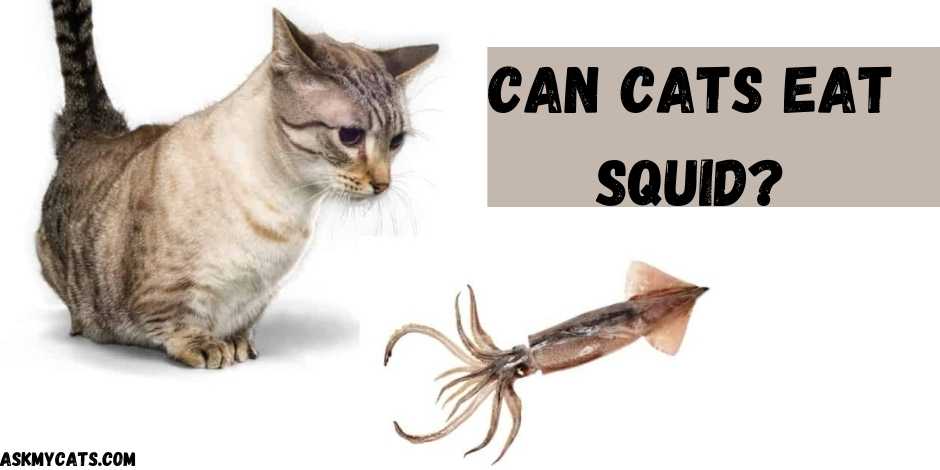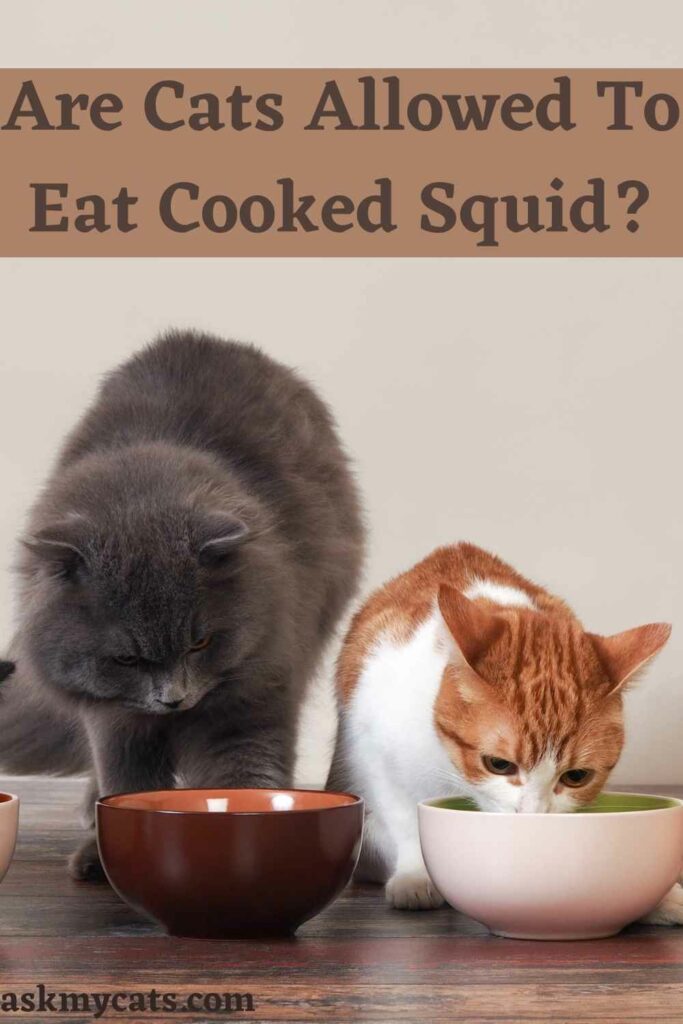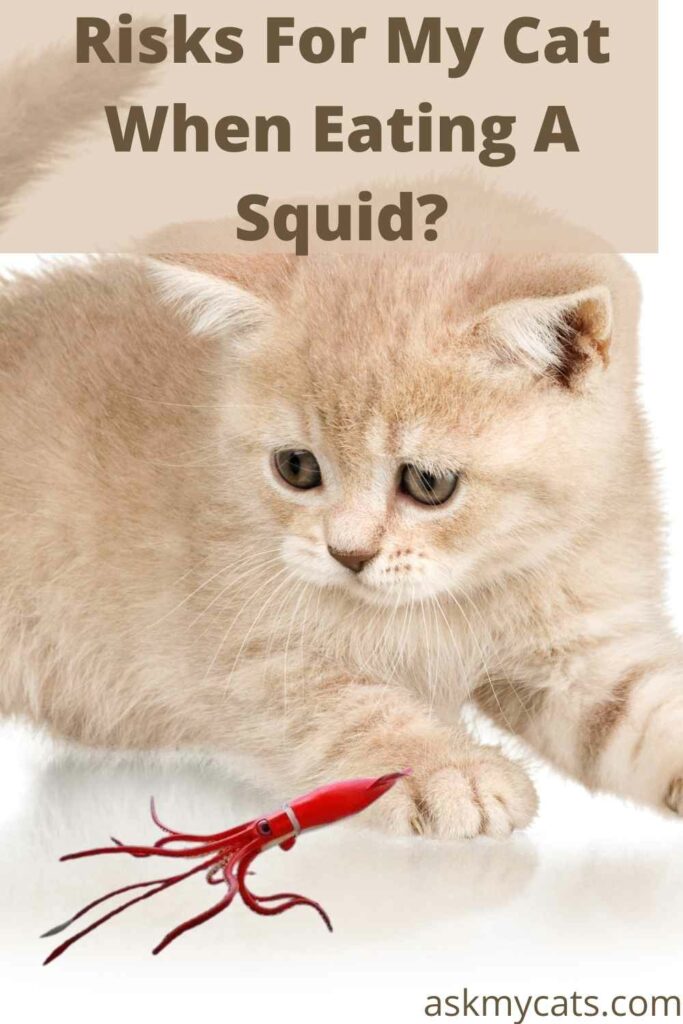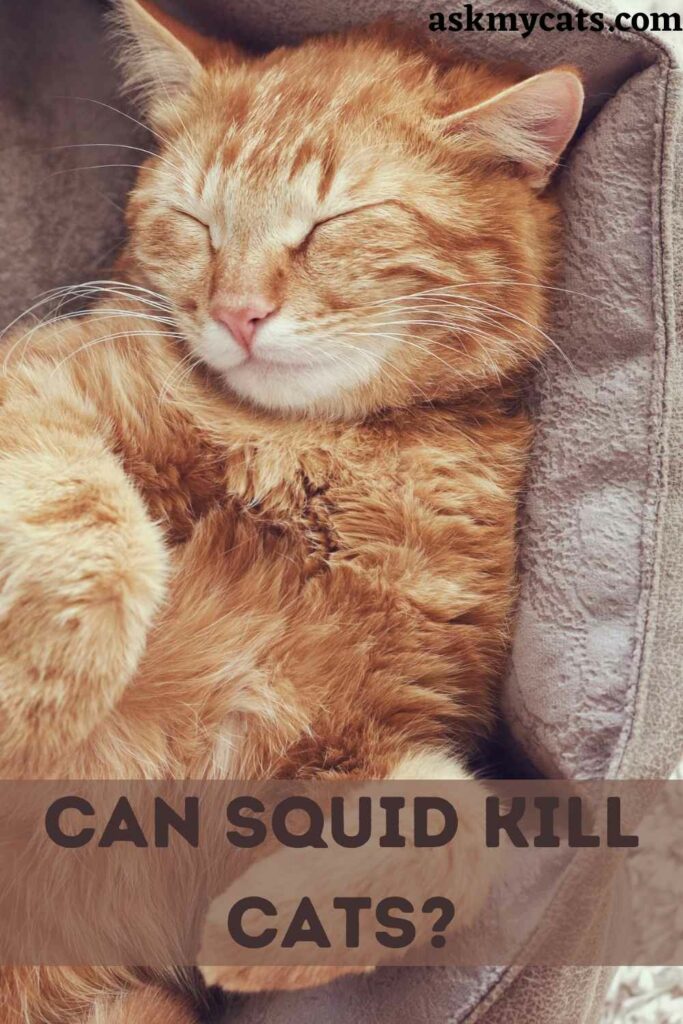Squid is a popular delicacy in many diets, particularly in the Mediterranean and Japanese cultures, however, calamari is a mainstay on many North American menus. Given that most cats enjoy seafood, it’s only a matter of time until they try squid. So, can cats eat squid?
Yes, cats can eat cooked squid in very little, precisely chopped pieces. To ensure that it is safe, we emphasize the importance of keeping it small and cut up. However, just because it’s safe doesn’t guarantee cats will notice. Not all seafood is equal in the eyes of a cat!
This article will talk about ways your cat can eat squid and possible risks related to your cat eating squid.


Give Your Cat the Perfect Day
Get the Free Ebook!
What Is Squid? Can Cats Eat All Kinds Of Squid?
Squid, like the well-known octopus, are soft-bodied aquatic creatures.
Squid, like the well-known octopus, are soft-bodied aquatic creatures. Squids vary in a wide range of sizes, from tiny to gigantic. While giant squids are uncommon, they can grow to be 40 feet long.
In terms of cuisine, however, most squid utilized in cooking is much smaller and harvested in large quantities. Squid can be found in a wide range of international cuisines, including Italian, Japanese, Korean, Chinese, Portuguese, and Turkish dishes.
Cats are unlikely to come across a squid in the wild, therefore they haven’t traditionally been a big part of the feline diet. Most cats, on the other hand, will eat squid if given the opportunity.
But proceed with caution! Squid isn’t always safe for cats. The danger in feeding squid to your cat is in the preparation method.
Can Cats Eat Raw Squid?
No, cats must never be fed raw squid as it could lead to food poising because of the bacteria present in the squid.
Raw squid should not be eaten by cats. Because raw squid includes bacteria, it can cause food poisoning in cats. It can also trigger thiamine breakdown, which can lead to neurological problems in your pet.
It’s also not very great in fried form (calamari). The only type of squid you can feed your cat is plain, boiled squid.
When cats consume raw squid, they are putting themselves in danger. The first danger is a foodborne disease, which is caused by bacteria. Another issue is the possibility of a chemical called Thiamine breaking down.
Thiamine is a B vitamin that is essential for the health of your cat. As a result, when thiamine is broken down in cats, they may experience difficulties walking and balancing.
Does Eating Raw Squid Paralyze Cats?
Yes, eating raw squid can paralyze a cat in severe cases.
Yes. Cats can get paralyzed if they consume raw squid. When cats eat raw squid, the B vitamin thiamine is broken down, which causes this.
Thiamine is required for healthy neurological function in cats. Thiamine is also involved in the conversion of carbohydrates to energy. Cats, like humans, require energy to go about their everyday routines.
When thiamine is broken down, it causes a slew of issues. First and foremost, there is a deterioration in neurological function. This causes difficulty walking and balancing, as well as paralysis in severe cases.
Are Cats Allowed To Eat Cooked Squid?
Yes, cats can eat cooked squid but only if it is plain and boiled and not fried.

Squid, unlike shrimp or salmon, is significantly more divisive among cats. Some cats will enjoy it, while others will despise it.
Cooked squid has a rubbery feel that will likely repel many cats, and since they can only eat it plain, there isn’t much to entice them.
Other cats will be intrigued by it, particularly if they watch you eating it, and will sample a slice, either like it or never wanting it again.
Squid can only be eaten by cats if it is basic and boiled. They cannot, however, consume fried squid.
This is due to the fact that it is frequently sautéed with seasonings and garnishes.
Their digestive tract is affected by the substances in the seasoning and oil.
Because it is sautéed in oil with seasonings and garnishes, calamari can be dangerous. The compounds included in squid, as well as the technique of preparation, may be harmful to cats.
If your cat enjoys squids, stick to the plain variety and make sure you boil it thoroughly.
Break up the squid into little pieces to reduce the risk of choking or asphyxia. Remember that squid has no discernible health benefits and should not be consumed on a regular basis by cats.
Perhaps the only genuine advantage of feeding squids to your cat is that she could find them tasty.
You should be aware that giving your cat plain, boiled squid is not without risk. You should not offer them on a regular basis to ensure that they do not lose interest in their regular diet.
Furthermore, boiling squid has a rubbery texture to it. This is a concern for cats since they may not be able to chew well. There’s a danger the squid will become lodged in their stomach, causing choking or suffocation. As a result, only give your cats plain and boiled squid in tiny amounts.
Benefits For My Cat When Eating A Squid?
The benefit of eating a cat eating squid is, squid contains a large amount of zinc which is an essential mineral for a cat’s health.
Despite the fact that squid is strictly a treat, it does have certain health benefits. The main advantage is zinc, which is abundant in squid.
Zinc is an important mineral for cats since it promotes healthy skin and fur and plays a role in female cats’ reproductive function.
Zinc poisoning can induce symptoms such as shivering, drowsiness, loss of appetite, and even death, although eating a small piece of squid every now and then is unlikely to cause this.
However, that’s about it in terms of health benefits, so if your cat doesn’t enjoy squid, they won’t be missing out on anything.
Squid should not be given to kittens since it provides no nutritional value and is likely to cause them to choke.
Risks For My Cat When Eating A Squid?
Risk for your cat when eating a squid includes, Foodborne illness, choking, seasoning, and your cat becoming addicted to squid.

1. Foodborne Illness
Squid is sometimes eaten raw in the form of sushi, but feeding it to your cats in this manner is never a good idea.
Squid, like other raw seafood, can cause foodborne infections such as salmonella or Vibrio vulnificus.
2. Choking
Even if you boil the squid and leave out the seasonings, it will be rubbery and chewy for your cat.
For your cat that has never seen such a texture before, this could be a choking hazard.
3. Seasoning
Calamari is the most typical way to serve squid in America. Calamari is seasoned and fried. Fried food is obviously unhealthy for your cat.
It is also unhealthy for humans, but we have the ability to make our own choices. Calamari is seasoned with a variety of flavors, some of which may be dangerous to your cats, such as onion or garlic.
4. Addiction
When you give your cat something new and exotic to eat, there’s always the risk that it will become too attached to the new food and refuse to eat its regular cat food.
While this can happen with any food, cats have a strong preference for seafood, and you could be setting your cat up for a squid addiction.
Can Squid Kill Cats?
Squid can kill a cat as fried squid poses a danger of vomiting diarrhea and even organ failure.

Squid is a divisive topic among pet owners, with some advising against feeding squid to cats and others claiming that it is okay if the squid is well cooked and neatly chopped.
Although raw squid is normally avoided, even cooked squid can cause harm or death to your cat.
For starters, cats should not eat raw squid. Bacteria that cause foodborne diseases can be found in raw squid.
If this goes on for too long, it can cause diarrhea, vomiting, and even organ damage.
Raw squid may also induce the breakdown of Thiamine, a B vitamin that is critical for your cat’s health.
When it breaks down, though, it might cause movement issues and convulsions.
Fried squid is especially dangerous since it contains oils, seasonings, and garnishes that can make a cat very sick, such as garlic, too much salt, or high-fat oils.
Calamari breading is extremely unhealthy for cats to eat and can make them sick.
Squid is best served boiled and simple or steamed to cats. Even so, because squid is highly rubbery and some cats have difficulty chewing it, this method isn’t failsafe. Choking is a risk as a result of this.
The only way to avoid this is to give your cat extremely small, very well-cooked squid pieces with nothing else on them.
And they shouldn’t be provided too frequently — cats who like squid may enjoy it, but you don’t want it to become their exclusive source of nutrition!
Alternatives Of Squid
The alternatives of squid include: –
- If your cat has a strong desire for seafood, there are a variety of treats available to satiate their demands. While most don’t include squid, there are lots of other possibilities, including shrimp, salmon, and tuna.
- Blue Buffalo with a seafood flavor could be great as the first ingredient listed on the container of Kitty Yums is fish, though the sort of fish depends on the flavor you choose. Many fish-flavored cat treats aren’t manufactured with real fish, which defeats the purpose!
- There are also canned seafood cat diets that can be used as a treat or as part of their regular diet. Canidae Seafood Recipe, for example, specifies fish as the first ingredient.
Frequently Asked Questions?
Can kittens eat squid?
Ans. Squid, in any form, should never be given to your kittens. Because they are still small. Plain and cooked squid poses a larger risk of choking. Additionally, if they become accustomed to the exquisite flavor of squids, they may develop into choosy eaters. They should consume foods that are higher in nutritious content for their growing bodies.
Can cats eat calamari?
Ans. No, cats can’t eat calamari as it is dangerous to eat since it is fried. It can wreak havoc on your cat’s digestive tract due to the seasonings and oil. The only type of squid you should give your cat is basic, boiled squid, but even that is dangerous.
Can cats eat oysters?
Ans. Yes. Cats can consume oysters in tiny amounts or moderation as a small part of their diet. They are nutritious, but they lack all of the nutrients that these creatures require for optimal growth, development, and adult maintenance. Furthermore, enteroviruses and bacteria have been linked to raw oysters.
Final Words
Squid isn’t something cats would see in the natural, so it’s understandable that they wouldn’t be very attracted to it or extract much nutritional benefit from it. Squid can be a tasty treat for some cats, but it also comes with concerns such as foodborne pathogens and disease, as well as choking and thiamine deficiency.
It’s not something your cat should eat on a regular basis, and it should always be prepared plain, with no seasonings or oil. If your cat enjoys it, keep it on hand as a treat and use it sparingly. If not, don’t panic; cats don’t require squid to be healthy.
If you have any other questions, ask us in the comments section.
